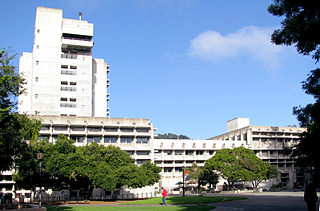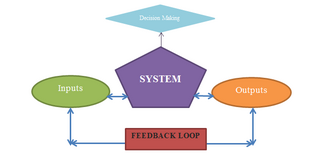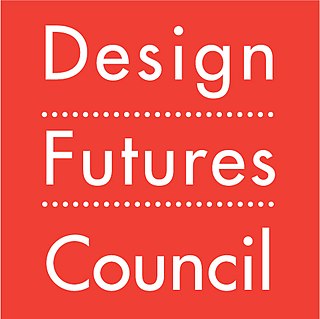Related Research Articles

Landscape architecture is the design of outdoor areas, landmarks, and structures to achieve environmental, social-behavioural, or aesthetic outcomes. It involves the systematic design and general engineering of various structures for construction and human use, investigation of existing social, ecological, and soil conditions and processes in the landscape, and the design of other interventions that will produce desired outcomes. The scope of the profession is broad and can be subdivided into several sub-categories including professional or licensed landscape architects who are regulated by governmental agencies and possess the expertise to design a wide range of structures and landforms for human use; landscape design which is not a licensed profession; site planning; stormwater management; erosion control; environmental restoration; parks, recreation and urban planning; visual resource management; green infrastructure planning and provision; and private estate and residence landscape master planning and design; all at varying scales of design, planning and management. A practitioner in the profession of landscape architecture may be called a landscape architect, however in jurisdictions where professional licenses are required it is often only those who possess a landscape architect license who can be called a landscape architect.

The College of Environmental Design, also known as the Berkeley CED, or simply CED, is one of fourteen schools and colleges at the University of California, Berkeley. The school is located in Bauer Wurster Hall on the southeast corner of the main UC Berkeley campus. It is composed of three departments: the Department of Architecture, the Department of City and Regional Planning, and the Department of Landscape Architecture and Environmental Planning.

Erich Jantsch was an Austrian-born American astrophysicist, engineer, educator, author, consultant and futurist, especially known for his work in the social systems design movement in Europe in the 1970s.

Ian L. McHarg was a Scottish landscape architect and writer on regional planning using natural systems. McHarg was one of the most influential persons in the environmental movement who brought environmental concerns into broad public awareness and ecological planning methods into the mainstream of landscape architecture, city planning and public policy. He was the founder of the department of landscape architecture at the University of Pennsylvania in the United States. His 1969 book Design with Nature pioneered the concept of ecological planning. It continues to be one of the most widely celebrated books on landscape architecture and land-use planning. In this book, he set forth the basic concepts that were to develop later in geographic information systems.
Richard Meyer may refer to:

Regenerative design is a process-oriented whole systems approach to design. The term "regenerative" describes processes that restore, renew or revitalize their own sources of energy and materials. Regenerative design uses whole systems thinking to create resilient and equitable systems that integrate the needs of society with the integrity of nature.
Ecological design or ecodesign is an approach to designing products and services that gives special consideration to the environmental impacts of a product over its entire lifecycle. Sim Van der Ryn and Stuart Cowan define it as "any form of design that minimizes environmentally destructive impacts by integrating itself with living processes." Ecological design can also be defined as the process of integrating environmental considerations into design and development with the aim of reducing environmental impacts of products through their life cycle.

Omar M. Yaghi is the James and Neeltje Tretter Chair Professor of Chemistry at the University of California, Berkeley, the Founding Director of the Berkeley Global Science Institute, and an elected member of the US National Academy of Sciences.
An urban planner is a professional who practices in the field of town planning, urban planning or city planning.

Lanxmeer is the name of an ecological neighbourhood built from 1994 to 2009 in the town of Culemborg in the Netherlands. It is an environmentally friendly housing development.

Peter Calthorpe is a San Francisco-based architect, urban designer and urban planner. He is a founding member of the Congress for New Urbanism, a Chicago-based advocacy group formed in 1992 that promotes sustainable building practices. For his works on redefining the models of urban and suburban growth in America Calthorpe has been named one of twenty-five ‘innovators on the cutting edge’ by Newsweek magazine.

The Design Futures Council is an interdisciplinary network of design, product, and construction leaders exploring global trends, challenges, and opportunities to advance innovation and shape the future of the industry and environment. Members include architecture and design firms, building product manufacturers, service providers, and forward-thinking AEC firms of all sizes that take an active interest in their future.
Richard Steven "Dick" Levine is an American environmental architect, solar energy and sustainability pioneer, and professor at the University of Kentucky. He is one of the early solar energy innovators in the U.S., a holder of U.S. patents on structural systems and solar energy applications, and the architect of a number of award winning solar buildings including his widely published Raven Run Solar House (1974). Levine is co-director of the Center for Sustainable Cities at the University of Kentucky. His contributions to sustainable urban planning are in both the theory and practice of the sustainable city-region. He has over 150 publications on solar energy and sustainability research, conducted in Italy, Austria, China and the Middle East.
Urban planning education is a practice of teaching and learning urban theory, studies, and professional practices. The interaction between public officials, professional planners and the public involves a continuous education on planning process. Community members often serve on a city planning commission, council or board. As a result, education outreach is effectively an ongoing cycle. Formal education is offered as an academic degree in urban, city, rural, and/or regional planning, and more often awarded as a master’s degree specifically accredited by an urban planning association in addition to the university’s university-wide primary accreditation, although some universities offer bachelor's degrees and doctoral degrees also accredited in the same fashion; although most bachelor’s degrees in urban planning do not have the secondary-layer of urban planning association accreditation required for most positions, relying solely on the university’s primary accreditation as a legitimate institution of higher education. At some universities, urban studies, also known as pre-urban planning, is the paraprofessional version of urban and regional planning education, mostly taken as a bachelor’s degree prior to taking up post-graduate education in urban planning or as a master’s or graduate certificate program for public administration professionals to get an understanding of public policy implications created by urban planning decisions or techniques.

Richard B. Norgaard is a professor emeritus of ecological economics in the Energy and Resources Group at the University of California, Berkeley, the first chair and a continuing member of the independent science board of CALFED, and a founding member and former president of the International Society for Ecological Economics. He received the Kenneth E. Boulding Memorial Award in 2006 for recognition of advancements in research combining social theory and the natural sciences. He is considered one of the founders of and a continuing leader in the field of ecological economics.

Urban planning, also known as town planning, city planning, regional planning, or rural planning, is a technical and political process that is focused on the development and design of land use and the built environment, including air, water, and the infrastructure passing into and out of urban areas, such as transportation, communications, and distribution networks and their accessibility. Traditionally, urban planning followed a top-down approach in master planning the physical layout of human settlements. The primary concern was the public welfare, which included considerations of efficiency, sanitation, protection and use of the environment, as well as effects of the master plans on the social and economic activities. Over time, urban planning has adopted a focus on the social and environmental bottom-lines that focus on planning as a tool to improve the health and well-being of people while maintaining sustainability standards. Sustainable development was added as one of the main goals of all planning endeavors in the late 20th century when the detrimental economic and the environmental impacts of the previous models of planning had become apparent. Similarly, in the early 21st century, Jane Jacob's writings on legal and political perspectives to emphasize the interests of residents, businesses and communities effectively influenced urban planners to take into broader consideration of resident experiences and needs while planning.
Richard Bender is an architect and urban planner with extensive experience in urban, campus and community design. He also serves as dean emeritus and professor of architecture at the College of Environmental Design at the University of California at Berkeley. Bender has also taught at The Cooper Union, Columbia University, the Graduate School of Design at Harvard University, the Massachusetts Institute of Technology, the Swiss Federal Technical University, and the Instituto Universitario Arquitettura in Venice.
Carl Anthony is an American architect, regional planner, social justice activist, and author. He is the founder and co-director of Breakthrough Communities, a project dedicated to building multiracial leadership for sustainable communities in California and the rest of the nation. He is the former President of the Earth Island Institute, and is the co-founder and former executive director of its urban habitat program, one of the first environmental justice organizations to address race and class issues.

Robert Cervero is an author, consultant, and educator in sustainable transportation policy and planning. During his years as a faculty member in city and regional planning at the University of California, Berkeley, he gained recognition for his work in the sphere of urban transportation and land-use planning. His research has spanned the topics of induced demand, transit-oriented development (TOD), transit villages, paratransit, car sharing, and suburban growth.
References
- 1 2 "Professor Emeritus, an Authority on Sustainability, Dies at 86". By Vincent Quan. The Daily Californian. Monday, April 9, 2007.
- 1 2 "Obituary: Richard L. Meier, "Super-Planner"]. Compiled by Karen Meier Reeds. 4/8/2007. Retrieved 17 June 2008 from andrea.testname.googlepages.com
- 1 2 3 4 Kathleen Maclay (2007) IN MEMORIAM Richard Meier 1920-2007. Office of Public Affairs, University of California.
- ↑ "Richard Louis Meier, 86; expert on sustainable planning". Los Angeles Times April 6, 2007.
- ↑ Richard L. Meier (2003). Ecological Planning, Management and Design. Online manuscript of his final work at berkeley.edu.